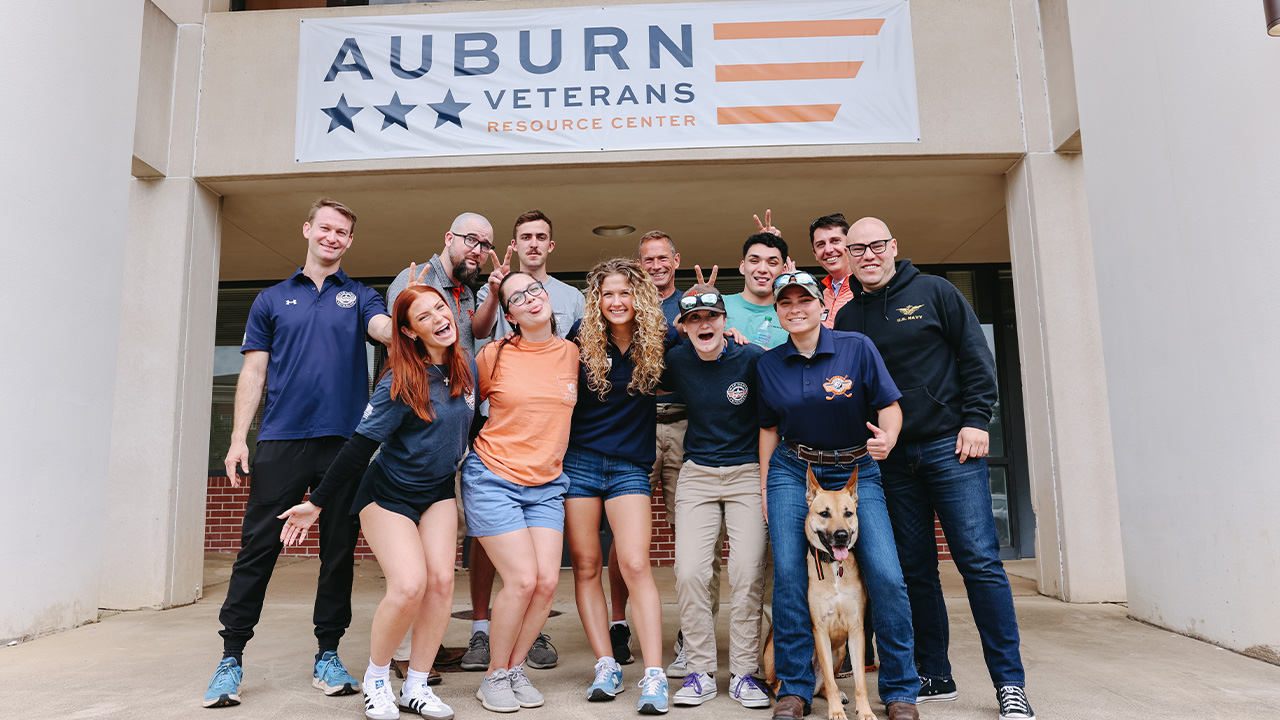content body
The Auburn Student Veterans Association (ASVA), housed in the Veterans Resource Center, is dedicated to building a supportive community for student veterans that enables academic and social success.
Recently named the most exceptional student organization by Student Involvement, the ASVA provides countless opportunities for military-affiliated students — and the group’s leadership has no intention of slowing down.
Healthy transitions
Madeline Graf, a senior in the College of Nursing and the organization’s president, got involved with the ASVA to meet fellow veterans and forge a deeper connection to the university.
“I wasn’t involved with anything when I first came here; it’s harder to get involved as a transfer and nontraditional student,” she said. “The association provided me with a sense of community and helped me get plugged in. Now I’m in a position where I can give back to the organization that poured into me as a person and helped me grow immensely.”
Graf’s vision for ASVA’s future is informed by both her studies in nursing and her experiences as a longtime member of the organization.
“A lot of people know us for our tailgating and fun events,” she said. “That’s great, and there’s a place for that, but I want the organization to be known for helping veterans live healthier. If we’re trying to grow them professionally and mentally, why shouldn’t we grow them physically?”
That professional and mental growth includes career networking events such as Third Friday Connections, scholarships, mental health outreach and more.
“Transitioning from the U.S. Navy to being a student has challenges, but ASVA has given me a place to belong on campus and connect with people who understand what I’ve gone through,” said Michael Taylor, the organization’s vice president. “It’s been a source of support, opportunities and friendships that have made my time at Auburn more meaningful.”
Honorary historian
You would never guess it now, but ASVA originally didn’t serve students at all. Founded in part by Michael Freeman, an alumnus and current environmental health specialist for the university, the group originated as a support network for faculty and staff members who had served in the military.
“I’d been on campus working for a couple of months when the idea came to me,” Freeman said. “I was looking for things to get involved with as a young staff member, and I thought, ‘why don’t we have a veterans’ group?’”
Their first meeting was in August of 2006, but by 2009, the group had shifted focus from building a faculty community to addressing student issues.
“Reacclimating to civilian life is difficult, and we didn’t have anything like ASVA or the Veterans Resource Center (VRC) at the time,” Freeman said. “The assistance provided to student veterans was administrative. We realized that what they really needed was the camaraderie that you create with your peers in the military.”
After shifting the focus to supporting student veterans, the need for a more robust resource center became clear. The VRC was established in 2012 and is housed in Foy Hall.
“Creating this space in Foy made all the sense in the world,” Freeman said. “I was fortunate enough to know Dean [James] Foy, and everyone loved him. He was a veteran too, so it just felt right.”
Resources for reacclimating
The current director of the VRC is retired Navy Capt. Paul “Puck” Esposito, a 30-year veteran and advocate for military-affiliated students.

Puck Esposito, a former Navy captain, is the director of the Veterans Resource Center.
“We identified several that we needed to address, and we did that through building a culture and climate student veterans would want to come to,” Esposito said. “What you don’t want to have is a veteran who is isolated. You want them to have a community as nontraditional students who are typically older, with different life experiences.
“While they’re here relaxing and interacting with others, we can identify what they may be struggling with and create programs to address those needs.”
Initiatives born out of these interactions include specialized math bootcamps and Auburn Warrior Orientation and Learning (AWOL), a peer-to-peer program offered to incoming military-affiliated students.
“There are some misconceptions about veterans and where they fit in on campus,” Esposito said. “Do you treat them differently, or do you not treat them differently? The answer is no — they are students, and they are part of the Auburn Family.
“However, if any organization on campus really wants to learn about what it’s like to be a student veteran in a nontraditional role, we have a training program called Green Zone, and I would highly encourage anyone to take it.”
Green Zone training helps organizations and individuals learn about the military-affiliated experience and promotes the inclusion and support of student veterans on campus.
“The Auburn community is one big family,” Graf said. “Being able to strengthen a portion of the community — in this case, student veterans and military-affiliated students — only strengthens the rest of the student body.”








